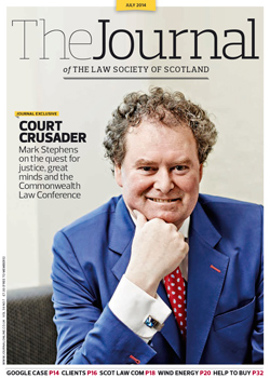President's column

My first full month in office has been a whirlwind of meetings, functions and discussions with colleagues from all sectors of the profession – all hugely varied and interesting, if demanding, though a couple of “feelgood” events stand out.
At the beginning of the month, the final of the Donald Dewar Memorial Debating Tournament was held in the debating chamber at the Scottish Parliament. The quality of debate from all those involved – perhaps some of tomorrow’s solicitors – was fantastic, and both Liam Stewart and Michael Davidson, from Craigmount High, are to be congratulated for their winning performance in the final.
Then, towards the end of June, again at Holyrood, I joined many others in celebrating the success of the scheme that encourages lawyers to offer discounted legal services for members of the armed forces. Founded by Scottish solicitor Allan Steele, more than 60 firms across Scotland have already signed up to Armed Forces Legal Action, and it was announced last month that the aim is now to expand the campaign to Northern Ireland, Commonwealth countries and beyond.
The Society is proud to support these initiatives, which are both a reminder of the privileged role of the solicitors’ profession, not just in providing quality legal advice at times of real need, but also by making a much wider contribution to society.
Influence at work
Several meetings with the country’s large firms have given me the opportunity to highlight the relevance and advantages of the Society’s dual representative and regulatory role, while also discussing the education and training of the lawyers of the future, bearing in mind the changing influence that clients have over service delivery and cost.
It is important that we continue to use the unique elements of Scots law that provide Scottish solicitors with competitive advantages. The value of the Master Policy as the glue that holds the profession together was also raised during discussions. Our professional indemnity insurance is great value for money. If firms negotiated on an individual basis, overall costs would inevitably rise and it would simply not be possible to achieve the same breadth of cover across the profession.
The Society’s strong influencing role with the Scottish Government was underlined in the past month with the significant concession that the proposed threshold for civil cases to be heard in the sheriff courts would be lowered from £150,000, as proposed in the Court Reform (Scotland) Bill, to £100,000.
We remain concerned that setting a limit above £50,000 could restrict people’s access to the higher courts, though this change goes some way towards mitigating the possible effects. Also, the sheriff courts must be adequately resourced to manage what will be a significant transfer of business, particularly with the programme of closures that is currently taking place.
The Society is also due to respond to the Government on the Scottish Independence Bill, which sets out a draft constitution and considers the issue of drawing up a permanent written constitution if there is a Yes vote in the referendum in September. As with all important proposed legislation, we will consider the detail before responding in full.
Conference time
Looking ahead, the full programme for the Society’s annual flagship Law in Scotland conference is currently being put together, with members able to register on our website. The event will take place just two weeks after the independence referendum, providing one of the first major opportunities to examine the result in detail. In asking “So what now?” the conference will look at the implications of the result for our economy, our society and Scotland’s place in the world.
Needless to say, the kind of practical and relevant business and professional development sessions for which the Law in Scotland conference has become known – both for in-house lawyers and those working in private practice – will also be available.
Likewise, preparations for next year’s Commonwealth Law Conference are coming together. A website (www.clc2015.co.uk) has been created and an outline programme drawn up, with some fantastic topics for discussion. It is great to see such progress being made as we continue to put together the programme of speakers.
More on this later, but some preparatory work has been carried out by the Council on updating the Society’s strategy. Given the pace of change for the profession and the justice system, it is vital that we ensure our strategic direction is up to date and representative of the issues solicitors are facing. As ever, members will be kept informed.
In this issue
- “The Union and the law” revisited
- Cartels: raising the stakes
- The cooling-off catch
- Attack vectors into the law: smartphones
- Money laundering: the Fourth way
- Has Glasgow morality come to Edinburgh?
- Reading for pleasure
- Opinion: Graeme McCormick
- Book reviews
- Profile
- President's column
- 10-year target
- Headline act
- Forget that you ever knew me
- The cooling-off catch (1)
- Tax devolution: the legal implications
- Ninth life
- Planning: how does the wind blow?
- Going off the rails
- Employee shares? Sort them yourself
- Angostura, anyone?
- National priorities
- Scottish Solicitors' Discipline Tribunal
- People on the move
- Heart of the action
- Helping solicitors on Help to Buy
- Conditions countdown
- Where bullocks fear to roam
- Fit to grant?
- Controlling the risks
- Ask Ash
- Opening up the law
- From the Brussels office
- Law reform roundup
- Post-corroboration Review update






